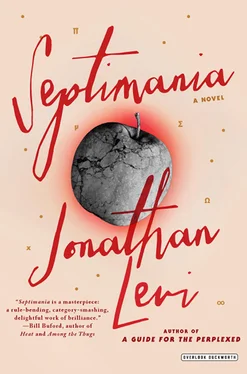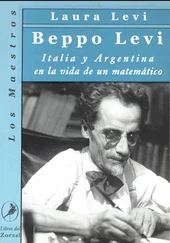“Dangerous?” Malory sat up.
“I’ll explain next time,” Louiza said, springing to her feet and stepping to the ladder.
“Next time?” Malory said, in some desperation that this time seemed to be drawing to a close. “Where? When?”
“Wherever you find that cat,” Louiza said. “Whenever.” She handed him the Pip with those slender, teeth-bitten fingers. “Remember: i = u .” And disappeared.
 HY DID MALORY LET LOUIZA DISAPPEAR? WHY DIDN’T HE JUMP up? Why didn’t he play Galahad and leap, or at least slide down the ladder from the steeple and out to wherever the breath of late afternoon had borne her?
HY DID MALORY LET LOUIZA DISAPPEAR? WHY DIDN’T HE JUMP up? Why didn’t he play Galahad and leap, or at least slide down the ladder from the steeple and out to wherever the breath of late afternoon had borne her?
The sun was in his eyes. Or rather, there was a vision, a curtain between the floor where Malory sat and the trap door down which Louiza had disappeared. A curtain, or better still, a gentle waterfall of light flowed down from the beveled slats of the roof to the wooden planking of the steeple floor. A dusty host of angels climbed up and down that mid-afternoon sunbeam, flapping their wings to the backbeat of a Hosanna over Malory’s Kit Bag, his Book of Organs, his Universal Tuner.
There was nothing unusual about any of the three. They were as worn and discolored as any of the million keepsakes that other solitary adolescents have adapted to adult use over their own histories. The Universal Tuner was a foot-long piece of twisted metal the ten-year-old Malory had found lying on a cairn in the hills outside Narbonne, that last summer he had spent with his mother. He had never been curious enough to ask about its composition, although it was clearly harder than the lead that made up the better organ pipes. He was thankful for the Universal Tuner’s angular eccentricities, its ability to scratch and bang and pry and cajole thousands upon thousands of pipes into harmonic precision, and its singular economy, as compact as a Swiss Army knife and as ingenious as a Geiger counter for diagnosing and curing the many ailments of the pipe organ, in their multitudinous variety. The Book of Organs was as near a diary as Malory had ever possessed — listing the name, the location, the birth date, baptism, and every subsequent tuning and idiosyncrasy of every organ he had played, tuned, cleaned, or vacuumed free of dust and mouse droppings, going back to the organ of the cathedral of Narbonne.
Both Universal Tuner and Book of Organs had special pockets in Malory’s Kit Bag, which was not lacking in the pocket department. It could hold half-eaten sandwiches, cake wrapped in waxed paper, music folios, and shoe polish. The Kit Bag was the only souvenir Malory possessed of his dead fisherman of a father, although why his father had the bag was a mystery. As far as Malory knew, his father had never been a soldier. In any case the bag was too small to be useful either as a duffel bag or a serious daypack. Green canvas was hardly the kind of waterproof material for a fisherman carrying bait and tackle and a fish or three, no matter how many pockets it had. But the Kit Bag, the one true link to his paternity, was stenciled on the flap in broken capitals:
MALORY
Tenuous and puerile as Malory realized such attachments were, there were moments in the drafty organ lofts of East Anglia when tracing the letters with his fingertips brought a certain warmth. All three — Universal Tuner, Book of Organs, and Kit Bag — were Malory’s constant companions. Yet something had happened to Malory in the steeple of the church of St. George’s, Whistler Abbey. And in case Malory was too dim to understand the significance, the seraphim of Nature were mobilizing to focus his eyes on the obvious.
The obvious sat in its own pool of atomized afternoon, atop the pebbled and abused cover of the Book of Organs. The Pip, the Pip that Louiza had pried from between the shutters of the steeple, the Pip that had brought Malory’s life into tune. The brown-husked mini-ovum of a Pip that drew the afternoon light into its brownness at the new center of Malory’s expanding universe. The Pip was the obvious cause of Malory’s change — or at least obvious to Malory, who could interpret the beating of his heart, the coursing in his veins, the dizziness of what others simply call love, only through the light and the gravity of his Newton. The Pip brought Louiza and Malory together, the Pip witnessed all that had gone between them. The Pip was the Sun that drew the Moon to the Earth and spun them around one another. The Pip would bring them back together for all time. The Pip would keep company with the Universal Tuner and the Book of Organs in his Kit Bag. The Pip would be his guide.
Malory packed the Pip into a plastic 35-millimeter film canister that he normally used for resin, wedged it safely into a pocket of the Kit Bag, added the Universal Tuner and the Book of Organs, and let gravity pull him back down the ladder to the nave. He was twice as tall when his feet touched the paving stones of the nave as when he had ascended that morning. He was certain that Louiza would be waiting for him outside St. George’s, or in the Orchard, or if not there, then not far away.
“Good afternoon.”
Not Louiza. In the cooler light of the second pew sat the Old Lady.
“Good afternoon, Hercule,” the Old Lady said again.
“Good afternoon—”
“Please,” the Old Lady said. “Come sit for a moment.”
Malory had no desire to sit, had no desire to talk to any old lady — this one, perhaps, in particular.
“Please,” the Old Lady said again. “I will not bite.” The crumbs of French at the edges of the Old Lady’s accent gave the invitation a certain force that Malory — being Malory and therefore incapable of giving offense — could not ignore. Malory sat. “You know who I am, I suppose.”
She was covered in a dusty blue and gray, although the dust, to Malory’s eye, was neither the dust of the angels nor the dust of neglect but more of a powder that softened the threads of her woolen suit, molded the silk at her neck into the ancient pockets of her skin and blended the powdered white of her hair into a hat that Malory would only remember as expensive in the way that history must be. But the sensation that struck Malory with the sharpest power — a power that he was soon forced to recall on many occasions — was the scent of pine and sun, the scent of the four-thousand-year-old yew in the churchyard, one he hadn’t smelled on a human being since the death of his mother nearly twenty years before.
“Mrs. Emery,” Malory said. “Good evening.” He knew she was Mrs. Emery. Old Mrs. Emery who lived alone, it was said, in the gothic pile of Whistler Abbey, a manor that overlooked the yew. Old Mrs. Emery, who for as long as Malory could remember had said nothing to him, but had placed a shilling in his palm following every service. Given the choice, Malory would have sooner spent a night in the churchyard than in Whistler Abbey with Old Mrs. Emery.
“Mrs. Emery,” she repeated. He saw another church, in the Cathar South of France when his mother was still alive, a land as hilly as the fens were smooth, the church where a younger Malory ran for the warmth and all-consuming vibrations of the organ, where he danced on the pedals because his feet could not reach from the bench, while his fist relaxed into a Bach prelude or a Saint-Saëns fantasy. “Hercule,” Mrs. Emery repeated. “I know that we have complex relations.”
Malory had survived by avoiding complexity, by seeking simplicity, in Newton, in Bach. But complexity was clearly the motif of the day — first Louiza with her i = u , her complex nature bound up in a web of numbers built from the square root of –1, and now Mrs. Emery, whose every breath reminded Malory that he had never known his father and had lost his mother at an age when the world was beginning to seem unbearably complex. Both Louiza and Mrs. Emery had found him at St. George’s Church, Whistler Abbey. Malory needed tea. Badly.
Читать дальше

 HY DID MALORY LET LOUIZA DISAPPEAR? WHY DIDN’T HE JUMP up? Why didn’t he play Galahad and leap, or at least slide down the ladder from the steeple and out to wherever the breath of late afternoon had borne her?
HY DID MALORY LET LOUIZA DISAPPEAR? WHY DIDN’T HE JUMP up? Why didn’t he play Galahad and leap, or at least slide down the ladder from the steeple and out to wherever the breath of late afternoon had borne her?










